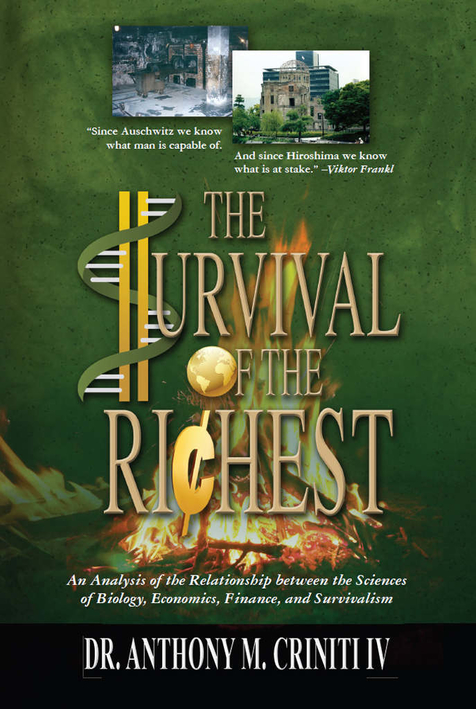
There are many survival guides on the market, some funny, some deadly serious, but there are certainly none like The Survival of the Richest: An Analysis of the Relationship between the Sciences of Biology, Economics, Finance, and Survivalism by Dr. Anthony M. Criniti IV.
This cross between textbook, philosophy journal and survivalist guide is undeniably educational, and stirring in its intersectionality. The author brings together ideas from biology, economics, finance, survivalism, anthropology, history, and philosophy to present potentially controversial, but thought-provoking concepts.
Founded on the idea that having a greater amount of wealth increases the likelihood of being able to survive, the author is quick to note that he is not suggesting that the richest people and nations will survive simply because they are rich. What follows is a comprehensive, well-penned and entertaining review of survivalism, much of which the average reader will have never encountered.
When the concept of money is introduced, and the history of finance, the angle of the thesis becomes clear, and by the time the biological aspects are introduced, it is obvious that the author has mired readers in a clever trap. It is difficult to argue with eloquent writing and logical statements that lead to natural conclusions. Criniti is as much a storyteller as a doctor, and he deftly outlines the path of humanity, our obvious assets, and our onus of responsibility in a very neat package.
For those who have struggled to understand any of the subjects listed above, particularly as they relate to the future and your place in it, this book will be illuminating. Gathering this much information in one place (the text is full of references and legitimate support) is an impressive achievement, and laying out a clear path of understanding for both laypeople and academics alike demonstrates a rare skill.
Critically speaking, there are some large gaps in the theories presented, which may even be evident to readers who are not intimately well-versed in all of the topics being discussed. The acceptance of humanity having stepped outside the normal process of natural selection, to which every other species is subject, is understandable and accurate. However, the proposal that an increased focus on wealth, albeit a more holistic one, is the solution to a problem largely caused by a global addiction to wealth, feels contradictory. This book relies optimistically – and perhaps unrealistically – on a fundamental change in humanity’s dragon-like relationship to hoarding wealth and capital, a change for which history offers no real precedent.
All of that being said, the manner in which these ideas are expressed is remarkably erudite and engaging. With literary references peppered in among foundational research papers and the conclusions of some of history’s great thinkers, a great deal of thought and planning went into the book’s execution. It is well-orchestrated as an extended lecture, with each prior piece feeding into what follows, like a brilliant lawyer outlining an airtight case. The leaps in scientific inference and the blending of theories may be distracting for some, but Criniti’s hypotheses are undeniably provocative, and at times profound.
For anyone who has ever looked at the future and wondered whether they will survive the potential societal breakdown to come, this is a fascinating take on what could keep humanity together, or at least what you’ll need if it falls apart.
Book Links
STAR RATING
Design
Content
Editing
Get an Editorial Review | Get Amazon Sales & Reviews | Get Edited | Get Beta Readers | Enter the SPR Book Awards | Other Marketing Services























Leave A Comment